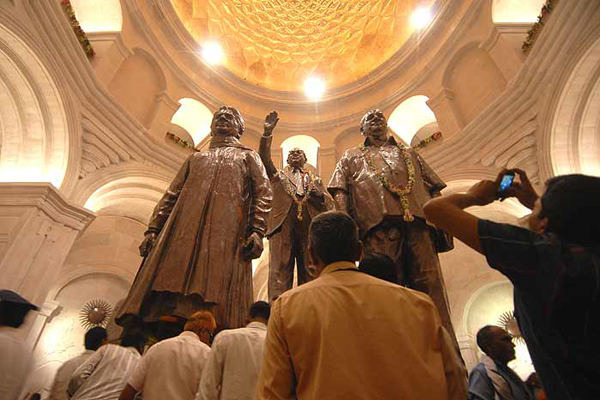
Addressing the nearly 2000 crowd comprising BSP workers and leaders, after paying tribute to Dalit icon Babsaheb Bhimrao Ambedkar at Ambedkar Samajik Parivartan Sthal in Lucknow on his 121 birth anniversary, Mayawati threatened any attempt at destroying Dalit memorials or constructing anything else on the land attached to them would lead to law and order crisis not only in UP but all over the country. She said that the SP government should take a leaf from the previous BSP government's book, which did not touch any memorial or park built by any earlier government, including that of the Samajwadi Party in the name of ideologue and personalities of other castes and communities.
Mayawati's statement on 'law and order problem', which many saw as an open threat of violent agitation, came soon after chief minister Akhilesh Yadav after meeting the Prime Minister in Delhi told mediapersons that people of the state have voted out those who used public money to build their own statutes and erect stone structures named after Dalits, which, however, did not benefit Dalits at all.
He reiterated that his government will not touch any statue at Dalit memorials. However, he said, the government can build hospitals for children and women on the huge chunk of land associated with the memorials but lying vacant. He said that in his view nobody would have any objection, if the vacant land is put to use of the public. He said that the people have given a clear mandate to the SP and his government will do what people want.
The move is being seen as Mayawati's attempt to keep her Dalit vote bank intact by creating a fear psychosis that SP government may harm Dalit memorials. She is also trying to provoke Dalits not to sit idle. Though Mayawati has been threatening a disturbance in law and order if Dalit memorials are touched for quite a while, her statement assumes importance now because cracks have appeared in her Dalit vote base in recent assembly elections as a section has voted for other parties.
In her address, she also tried to impress her vote bank by counting welfare schemes and public utility services such as construction of universities and hospitals in the name of Dalit icons implemented during her regime.






Comments
Add new comment